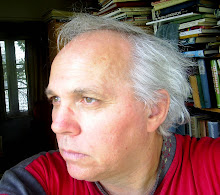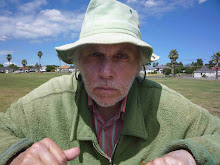NOTE - This will probably not reflect what I want in terms of lay out.
(And indeed it didn't - but I am limited by this medium -the effect is however interesting and approximates the original layout thematically.)
 To the right - view of the Auckland ferry building and wharf nearby painted in pastels and water colour by my father Leslie Stuart Taylor (1907-1987) who was an artist and an architect originally from London - about 1927. He taught me many water colour and other techniques, such as perspective and colour mixing when I was about 9. He gave away most of his works -he came to have an aversion to the commercial use of art things - but I'm not sure as one work was sold to the NZ poet R A Mason in the Depression . The other comment my mother made was that he gave them away as presents eg for weddings as he didn't have much money in the early days (1940s ). When I was young we were in fact very well off - atleastin contrast to many around us in the workng working class area of Panmure - my father indeeed got a very good salary. While he strongly supported conservative politics - he seemed to feel (perhaps came to believe) that selling art was not a good thing.
To the right - view of the Auckland ferry building and wharf nearby painted in pastels and water colour by my father Leslie Stuart Taylor (1907-1987) who was an artist and an architect originally from London - about 1927. He taught me many water colour and other techniques, such as perspective and colour mixing when I was about 9. He gave away most of his works -he came to have an aversion to the commercial use of art things - but I'm not sure as one work was sold to the NZ poet R A Mason in the Depression . The other comment my mother made was that he gave them away as presents eg for weddings as he didn't have much money in the early days (1940s ). When I was young we were in fact very well off - atleastin contrast to many around us in the workng working class area of Panmure - my father indeeed got a very good salary. While he strongly supported conservative politics - he seemed to feel (perhaps came to believe) that selling art was not a good thing.(I am not a great fan of the grossly inflated art market). (Which is why I will never ask permission to copy any artist's work... art and poetry etc belong to everyone.
His father in London in contrast was a very succesful bsuinesman and bought and sold shares etc - opened a dance school and was a pioneering photographer - member of the Royal Society of phographers. There was some bitterness between them never resolved so thus his view against insurance -my grandfather was involved eventually in insurance - (but my father never bought any) and selling art. (Although I heard much of this second hand and it is not clear to any of our family). This attitude was nothing to do with socialism. He supported both Holyoake and Muldoon and was proud to be a professional worker. He was glad to have raised himself from the level of mere workers and felt himself superior to ordinary workmen. This wasn't complete contempt, but while, for example he liked Mason's poetry and knew his communist views, but couldn't imagine such a cultured man ever taking part in subversive activities. But he did admire Sutch and Mason and Fairburn whom he met at the WEA before the 2nd WW. He had one exhibition that was highly praised in a newspaper of the time.

Close up of egg cartons, photographed and modified by me. Everything to make an entire animal is contained in each of those ovoid things contained in that container - and I have consumed them - this has enriched my body - eggs symbolise so many things - of course. Look at my picture of the Universe in a previous post! (Curtesy the physicist Weisenberg).
 God to Dog by Julia Morison - conceptual and minimalist artist - this is only a fragment of her huge works -very large sheets with hundreds of words printed on them. I don't know much about her work but Dog in my notes to Eyelight is indeed howI refer to God to remove any of the multiplex connotations associated with that word. Words are dangerous.
God to Dog by Julia Morison - conceptual and minimalist artist - this is only a fragment of her huge works -very large sheets with hundreds of words printed on them. I don't know much about her work but Dog in my notes to Eyelight is indeed howI refer to God to remove any of the multiplex connotations associated with that word. Words are dangerous.Eyelight - Room 5
by grass and dust, the road I strode
unto and into the slit green goat (unto and into the slit green goat ( unto and into the
who dances claps to flute and light (who dances claps to flute and light
And neither the. Clack sound, like knitting. (Clack sound, like knitting (Clack sound, like knitting (Clack sound, like knitting (Clack sound, like knitting
muscles contract zzzzzz │....sprout.│zzzzzzzzzzzzz accompanied
pressure in the zzzzzzz│.. eggs .... │ zzzzzzzzzzzzzzzzzzzz mouth
causes the oper zzzzzzz│ .. of gol ...│zzzzzzzzzzz culum to bulge
so there will be zzzzzzz│... and w...│zzzzzzzzzzzzzzz a reduction
flexible free edge zzzzz│.... mud ....│zzzzzzzzzzzzzzzzzzzzzzzz
zzzzzzzzzzzzzzzzzzzzzza│.............│zzzzzzz the mouth closes
and the squeeze zzzzzz │... sly f....│zzzzz the operculum wall
high pressure zzzzzzzzz│.............│zzzzzzzzzzzzzzzzzzzzzzzz
zzzzzzzzzzzzzzzzzzzzzzz│....five...│zzzzzzzzzzzzzzz is drawn
insects zzzzzzzzzzzzzzz│.. eyes ...│zzzzzzzzzzzzzzzzzzzzzzzz
oxygen enters zzzzzzzz│............│zzzzzzzzzzzzzzz the body
zzzzzzzzzzzzzzzzzzzzzzz│............│zzzzzzzzzzzzzzzzzzzzzzzz
zzzzzzzzzzzzzzzzzzzzzzz│............│zzzzzzzzzzzzzzzzzzzzzzzz
zzzzzzzzzzzzzzzzzzzzzzz│.. silence.│zzzzzzzzzzzzzzzzzzzzzzz
through the zzzzzzzzzzz│...........│zzzzzzzzzzzzzzz spiricals
zzzzzzzzzzzzzzzzzzzzz│.............│zzzzzzzzzzzzzzzzzzzzzzz
zzzzzzzzzzzzzzzzzzzzz│.. shapes.│zzzzzzzzzzzzzzzzzzzzzzz
to the zzzzzzzzzzzzzzz│.. ever ....│zzzzzzzzzzzzzzzzzzzzzzz
tracheole zzzzzzzzzzzz│... never ..│zzzzzz they give oxygen
zzzzzzzzzzzzzzzzzzzzz│.............│zzzzzzzzzzzzzzzzzzzzzzzz
and take zzzzzzzzzzzz│.. like T ....│zzzzzzzzzzzzzzzzzzzzzzzz
zzzzzzzzzzzzzzzzzzzzz │.. was......│zzzzzzzzzzzzzzzzzzzzzzzzz
zzzzzzzzzzzzzzzzzzzzz│... young...│zzzzzzzzzzzzzzz materials
zzzzzzzzzzzzzzzzzzzzz│... once ....│zzzzzzzzzzzzzzzzzzzzzzzzz
zzzzzzzzzzzzzzzzzzzzz│... life .......│zzzzzzzzzzzzzzzzzzzzzzzzzz
zzzzzzzzzzzzzzzzzzzzz│.... No.......│zzzzzzzzzzzzzzzzzzzzzz Yes.
________________________________________________________________________



